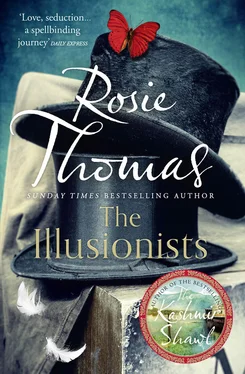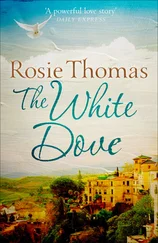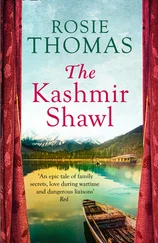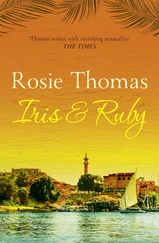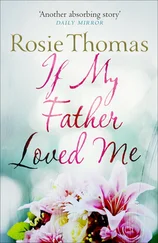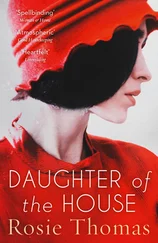1 ...8 9 10 12 13 14 ...27 Jasper passed him a cup and they settled beside the fire.
Once, long ago, the two of them had been amongst a crowd of gaping children who had watched the performance of a few magic tricks in a painted canvas booth set up by a travelling conjuror on the village square. The man had been more of a tramp than a real performer, and the sleights as Devil now recalled them had been shabby and fumbling. But still, here was a man who could make a white rat appear from a folded pocket handkerchief and who could grasp a shilling out of blue air. They hadn’t been there an instant before, but the rat and the shilling were definitely real. He could still remember how the sleek warmth of the animal had filled his hands when the conjuror asked him to mind it for him, and he could taste the coin’s metal between his teeth when he had tested it with a bite. How had such solid things appeared from nowhere? What strange dimensions existed beyond the range of his limited understanding?
Everything he had known up to that point had been narrow, painful, humdrum, and devoid of mystery. There was his own confined world and then there was beyond, somewhere out of reach, where great events took place. Yet here he was in the centre of the ordinary with the extraordinary somehow taking place right in front of him. To witness the magic had been his first experience of wonder, and it had filled his childish heart with yearning.
All around him his friends and their brothers and sisters were shouting and jeering and trying to grab the rat or the shilling but Devil was silent. All he wanted was to see more magic, to be further amazed and transported, and at the same time he was envious. Why was it not given to him to create wonder in the same way? What a gift that must be, he thought, as he gazed at the grog-faced man in the canvas booth with his tattered string of silks and his hands that shook so much he dropped his shilling, to the great amusement of the crowd.
Ten-year-old Hector Crumhall hardly knew how, but he understood that the bestowal of wonder was the ticket that was going to carry him out of Stanmore.
At the end of the scrappy show a few halfpennies and pennies landed in the man’s hat. He gathered them up and peered at the skinny black-haired boy waiting at the edge of the booth.
‘Mister? Can I do that with the rat?’
The man coughed and spat a thick bolus into the grass at his feet. The wooden struts came down and the canvas with its daubed stars and moons and strange symbols was strapped into a package ready to be hoisted on the traveller’s back.
‘Only if you learn the craft, boy.’
‘How? How can I learn?’
‘Ah, that’d be difficult enough. I’d say you’d have to find a ’prentice master in the magic trade.’
The man was ready to leave and Devil looked past him down the lane that led southwards to London. The path through a hollow way beneath oak trees and out across the fields had never seemed so enticing.
He begged, ‘Take me with you. If you teach me how to do those things like you did I’ll carry your bag for you, mister.’
The man didn’t even smile. Devil was surprised that his offer wasn’t instantly taken up. He thought he would make a fine apprentice.
‘You stay here with your ma and pa. You don’t want to be getting yourself a life like mine.’
With that he picked up the last of his belongings and trudged away. Devil stood and watched until the man turned the corner. His body twitched with longing to follow. For weeks afterwards he daydreamed about magic and regretted his failure of courage when the moment of opportunity had presented itself.
Devil’s father was the village schoolmaster, a man who had just enough education to be aware of how much he did not know. Mr Crumhall’s only child had been intended for the Church, but Hector was barely eight years old before it became clear that he was an unsuitable candidate for the cloth. He stole apples, raided the dairy, bullied children who were bigger than himself, and to his father’s constant disapproval only paid attention to what interested him. He was a slow pupil even in the undistinguished setting of the village school. After the travelling performer’s visit, what did interest him was the craft and performance of magic. He pestered his father for information. One of the mysteries that intrigued him was the difference between magic and conjuring.
‘Why are there two names?’
‘Conjuring is tricks. Packs of cards, vanishing handkerchiefs, deceptions of the eye for fools with money to throw away on tawdry entertainments.’
‘What is magic, then?’
He wanted his father to acknowledge the transport of wonder, and to give him permission to immerse himself in it.
‘There is no such thing as magic, Hector. There is only truth, and God shows us the way of that.’ Mr Crumhall was a quietly devout man.
‘What is alchemy?’
His mother glanced up from her darning and frowned at him, and his father became impatient. ‘Only charlatans ever believed in such a thing. There is no process that can turn base metal into gold, or make any such transformation, and all the business of mumbo jumbo associated with it is nothing more than the devil’s work.’
The child thought he had never heard anything so fascinating, and that the devil’s work sounded a good deal more interesting than anything he was required to do, in the schoolroom or out of it.
‘Why?’
‘Creation is the Lord’s, Hector.’
Hector continued to talk about magic, and its lowly cousin conjuring (as he thought of it) so incessantly that Mrs Hargreaves of Park House, for whom Mrs Crumhall did some sewing, presented him with a book from her late husband’s library. It was small, with worn red covers and endpapers printed with signs and symbols that thrillingly reminded him of the traveller’s booth. The title was The Secrets of Conjuring Revealed , by Professor Weissman. Hector raced up to his bedroom with this treasure and began to read.
At first he was disappointed. The print was tiny, there were far too many long words like instantaneous combustion and proscenium , and whilst there were a few intriguing engravings of disembodied heads floating in mid-air, quite a lot of the illustrations were tedious geometrical diagrams showing dotted lines diverging from a sketched representation of a human eye. He persevered, painstakingly consulting the dictionary on his father’s bookshelf, only to be further disappointed because most of the secrets that the Professor revealed employed special apparatus – hollow coins, wires as fine as human hair, or something called an electro-magnet. There was one effect, however, that only called for a handkerchief, a piece of string and a coat sleeve, all of which items happened to be available. While his mother’s back was turned he took a needle and a piece of thread from her workbox and stitched the end of the string to the centre of the handkerchief. This in itself was difficult enough, resulting in a blood-blotched cotton square and a frayed piece of string.
Next he memorised the sequence of movements described in the book and began to practise bending and straightening his arms and making a sharp clap of the hands. There was a framed looking glass on his mother’s washstand, and he stood in front of this for hours.
Then at last, for an audience consisting of Jasper Button, Jasper’s two sickly sisters and poor Gabe who didn’t understand much, he performed for the first time the Handkerchief which Vanishes in the Hand.
Gabe’s jaw fell open in astonishment when the handkerchief disappeared, and he shouted out in his clogged voice. ‘Gone! Gone!’
The Button girls’ shrivelled faces shone with unaccustomed pleasure and even Jasper was deeply impressed.
Читать дальше
